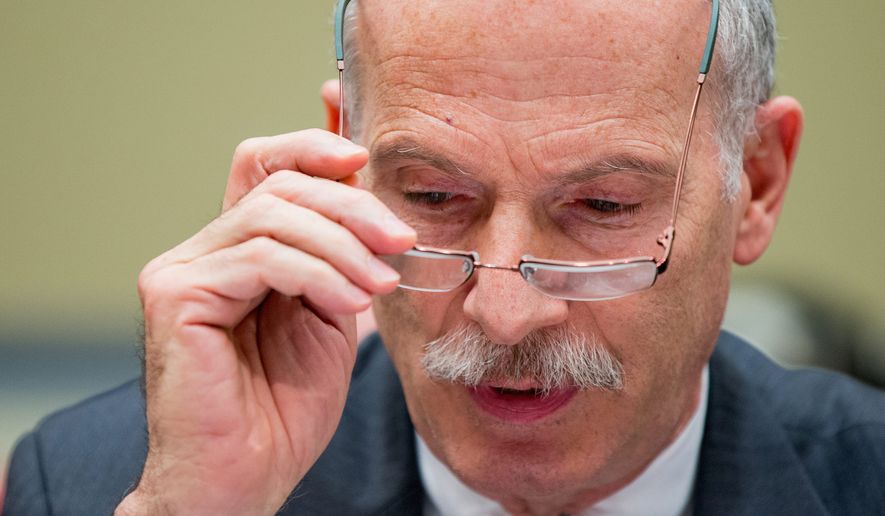D.C. Council Chairman Phil Mendelson said Wednesday that he is “absolutely not” satisfied with the District’s top procurement officer’s reasons for the increase in late contracts requiring retroactive approval by the council.
“The executive [mayor’s office] needs to understand if the executive is going to continue to play with the council with theses retroactive contracts, then we will look to the sanctions to make it more difficult,” Mr. Mendelson told The Washington Times after an oversight hearing on the issue.
The at-large Democrat floated the idea of banning some “partial” contracts, which can be amended to require more funding and retroactive approval.
The council is required to oversee and approve all city contracts over $1 million and any multiyear contracts. Some agencies have drafted partial contracts below $1 million and later seek council approval to extend the contracts for a full year, making them exceed the threshold. These are called “tipping” contracts.
Since last January, the council has had to retroactively approve via emergency legislation 63 contracts that originally were executed below the $1 million threshold.
Mr. Mendelson noted that the council passively approved 396 contracts since last January, saying this shows “the executive can get contracts to us timely.”
Most of the 63 late contracts were deals already approved by the council that were to be renewed. Lawmakers are blaming city contract managers of poor planning, saying their agencies should know when contracts are to be renewed.
“Often these requests are presented alongside dire predictions of harm to our residents should the council not immediately approve the contracts,” said council member Robert White Jr., the at-large Democrat who cochaired the hearing. “These emergency measures occur due to poor planning in the procurement process or due to intentional manipulation in the process.”
Chief Procurement Officer George Schutter argued that very few of the 63 contracts are actually late because the process of exercising partial option periods is “standard contract administration,” which is “in line with best practice.”
“To conflate a retroactive contract with a tipping action is to ignore the difference between the prohibitive procurement practice and the executive operating well within its authority,” Mr. Schutter said in his opening remarks. “That is, Mr. Chairman, equating the two ignores the difference between what is illegal and what is not.”
Mr. Mendelson responded by reading Webster’s dictionary definition of “retroactive.”
Earlier this month, Mayor Muriel Bowser told The Times that she doesn’t regard the council’s retroactive approval on tipping contracts as making them “late.”
“I don’t know that we have a plethora of contracts coming late, let me start there,” Miss Bowser said. “When I became mayor, I created a review board — our contracts Procurement Accountability Review Board where the city administrator, myself and the chief procurement officer review any retroactive contracts.”
The Democratic mayor said the review board “has been pretty inactive the last year, which means we haven’t had any [late contracts]. So if we had some at the end of the last year, they were anomalous.”
At Wednesday’s hearing, Mr. Schutter said there are several reasons why an agency would execute a partial contract and later extend it for the full term, such as federal law, budgets and services, adding that it would be “improper” to execute a full contract if the agency anticipates a change.
The chairman questioned why contract summaries don’t clearly explain why contracts are arriving late for council approval.
For example, the council retroactively approved at the beginning of this month a second-option year contract between the D.C. Department of Behavioral Health and MBI Health Services LLC, which was drafted for $545,798.50 as a partial contract but was then edited to $1,091,597 — the same amount as the first-option year contract that expired in July.
The reason, as stated in the contract summary: “The contracting officer issued a contract action to support DBH’s request for services to be provided under option year two in a manner to prevent a disruption to the consumers and families being served or who could be best served under the contractual services.”
Mr. Schutter agreed to offer more transparency in the contract summaries.
“I’m not saying you can’t exercise partials. I am saying, why was this not negotiated sooner? Why is it after you know what the budget is going to be, it takes another month for the [chief financial officer] to certify the funds?,” Mr. Mendelson said. “Did you have to go search for the funds? We budgeted for them.”
Negotiations take time, and a contract officer can’t “wave a wand over the negotiation to make it happen,” Mr. Schutter said.
• Sophie Kaplan can be reached at skaplan@washingtontimes.com.




Please read our comment policy before commenting.